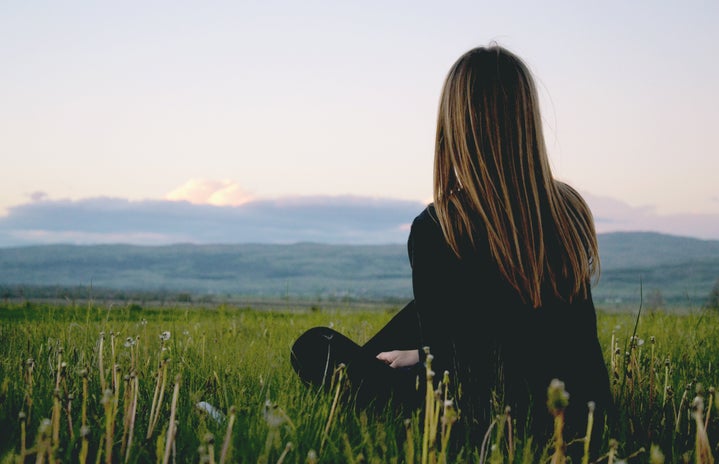Safehouse Denver stands as the only organization in Denver that serves adults, youth, and children experiencing domestic violence, providing empowerment and awareness through community and educational efforts. In honor of Domestic Violence Awareness Month (DVAM), I interviewed Abigail Hansen, the Director of Counseling and Advocacy Services at Safehouse Denver, to provide further insights into domestic violence awareness.
- What inspired you to work for SafeHouse Denver?
-
“I have been with SafeHouse Denver for eight years now, and through the course of my 16 years as a social working professional, I have always been drawn to gender-based violence work. So when I came to SafeHouse, I had taken a little bit of a break in my career when I had my first son, and so I was just looking for a way to kind of get back into the work that I love. An opening came up at our emergency confidential shelter program, and to be honest, it fit with my schedule as a new working mom. Working at the shelter is something that could be flexible with the shifts. But really, it was just so critical for me to reconnect with being in a safe place as a survivor in that journey. The stories I have heard over my time are both tragic and also really inspiring that people can transcend really horrible things and be better people for it.”
- What does your typical workday look like?
-
“My day probably looks a little bit different from our direct service staff because I supervise our nonresidential team as well as manage our program. So my day is just a bunch of craziness with meetings and reports. What might be more interesting is to tell you about a typical day of a domestic violence advocate. Here at our nonresidential program, our advocates have a caseload of individual counseling clients, so they would either be meeting with new survivors who have just reached out to get support and they’re just in the early stages of their journey in trying to figure out what are safe and appropriate next steps for them, or they have continuing clients that they’ve been working with for months, maybe years, that are a little bit further along in their journey. Our emergency shelter program advocate is going to walk into their shift and see who is in the space at any given time. Our beds turnover pretty frequently, so it may be that one starts their shift and there’s a new resident. The job would be getting to know that resident and what their needs are and how we can support them at that time.”
- What initiatives is SafeHouse Denver taking to raise awareness on domestic violence?
-
“In our community outreach and education program, we try to engage with the community as much as possible. October is Domestic Violence Awareness Month, so we have been particularly active in this month. Actually, just this morning we had two of our former clients, a former board member, as well as our chief development officer on the Kathie J Show on the local news, and the point of that was for the survivors to share their stories so that hopefully people in the community that hear that are either inspired to take action or maybe survivors themselves hear that story and think, ‘Wow if these two women can overcome, I can too. It’s time for me to reach out for help.’”
- Do you have a favorite memory or story from your experience here at SafeHouse?
-
“I have so many memories and stories. Maybe sort of a collection of memories. Each year, usually in September, our whole team gets together for a fun staff, team-building appreciation event where the organization is able to get lunch catered and we eat together, and we try, just for a brief moment in time, to not talk about the work and talk about ourselves and get to know each other. It’s been difficult to do that with the pandemic, but I’ve been there for eight years, and I love learning about my coworkers’ journeys and what brought them to this work and why they love working at Safehouse and to connect with the joy of this work, too because it is such a heavy topic. It is so critical for us to be able to get together and laugh together and support one another.”
- What would you consider the most valuable aspect of SafeHouse Denver?
-
“I think the ability for survivors to speak with our advocates confidentially is critical. As community-based domestic violence advocates, survivors have privilege with us. So that layer of confidentiality is even stronger than what a traditional mental health professional does. Survivors know that when they are speaking to us, we are people with whom they can share the deepest darkest parts of their experience. Our approach as a trauma-informed organization is that it is never our job to tell a survivor what to do or even to give advice because the survivors are always the experts of their own experience, and our job is to guide them and support them. Once survivors realize that they really get to drive the bus in this process, that’s pretty fantastic.”
- Was there a moment where you were challenged in your work? If so, what did you learn from it?
-
“I think I’m challenged every day in this work. There have been examples where we had to make difficult decisions to have a client exit from our services. In our emergency confidential shelter program, it is a community-living environment, and those that are in residence there are all survivors of trauma. Safety is critically important. However, we also recognize that survivors were sometimes coping in ways at face value that was really problematic, like drugs and alcohol. We also have survivors that have mental health needs. There have been times when some of those mental health needs or dependence on drugs and alcohol have created safety concerns in our space, and we had to turn people away. I know that my decision is based on the safety of the whole and it’s the right thing to do. A survivor at that moment might not see it that way, and it can be really hard to have that conversation.”
- Is there something about domestic violence that many people don’t know about? Or was there anything regarding the topic that surprised you?
-
“I think it’s really important for people to be aware that domestic violence is not just physical abuse. That can be a component for many of the people we work with; there is that element of physical assault, but I think people will be surprised to hear that we work with a number of folks who experience emotional and psychological abuse, financial abuse, and sexual abuse. The sexual abuse piece is something that people don’t often talk about. You don’t necessarily think about that when you think about somebody who is going through domestic violence. When our survivors come into our services, they typically don’t share that right off the bat with us anyway. It’s usually something that gets disclosed way down the line when they have already developed a real lasting relationship with us that those stories start to come out.”
- In your opinion, what do you think will be the future outlook of domestic violence within the next ten years?
-
“I would like to say that we get to close our doors because we have solved the problem of domestic violence. Unfortunately, I don’t think that’s going to happen. Domestic violence has been with us since the beginning of time, and it’s something that we keep tackling year after year, but I do think that we are seeing much more efforts of just larger community awareness and people taking a stand against this issue. That has had an effect on our funding. We have better relationships with potential funders so that we can amplify our work and reach out to marginalized communities where we get to focus on things like services. I think they’ll see some more innovative programming in the next ten years.”
- According to the World Health Organization, domestic violence has been prevalent, especially against women. For people who suspect that they are experiencing abuse, what would be your advice for them to stay safe?
-
“Number one is to trust your own instincts. We often have loved ones in our lives who with really good intentions tell us what to do; I certainly know that I do. As somebody who is supporting or loved a survivor, we might unintentionally leave them in a direction that is actually not safe. Survivors are really skilled at navigating safety at every moment. I would say to somebody who might be in an abusive relationship, first of all, whatever you’re doing right now to stay safe is the right thing. Also, there is help and support available. Organizations like Safehouse Denver have a 24-hour crisis and information hotline. We are here for you to call and talk with confidentially. We will never tell you what to do, but we can help you talk through what some of your options would be so that you can make an informed decision.”
- What are actions that we can take, whether we’re college students, working professionals, or even as children, in order to help raise awareness against domestic violence?
-
“Things like this [interview] and getting the word out to your local communities that there are domestic violence organizations that have staff available to provide support. It makes all the difference in the world to people that are considering getting help for their situation. During all the years that I’ve been doing this, it’s heartbreaking to know that there are still people out there that have no idea that there was a shelter community. The more that folks can talk about resources that are available, the better. Domestic violence is an issue that affects our community. Whether you know it or not, you are in classes and meetings and in church with people that are experiencing abuse. The way that you talk about this issue, survivors are listening, so our message is that we believe survivors and hear them and are here for them.”
Domestic violence is an important topic that may be overlooked in various communities. Just as Abigail mentioned, bringing awareness to this topic is crucial, because when it turns into a reality, we need to have the tools and resources necessary to handle it. Abiding by their mission, Safehouse Denver empowers each and every one of us to stay safe, do what is right, and advocate against domestic violence.
If you would like to learn more about Safehouse Denver, click here.


